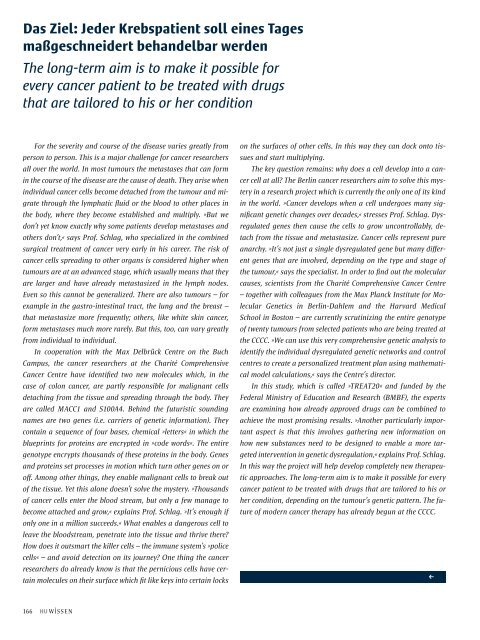hu wissen (pdf) - Exzellenzinitiative - Humboldt-Universität zu Berlin
hu wissen (pdf) - Exzellenzinitiative - Humboldt-Universität zu Berlin
hu wissen (pdf) - Exzellenzinitiative - Humboldt-Universität zu Berlin
Sie wollen auch ein ePaper? Erhöhen Sie die Reichweite Ihrer Titel.
YUMPU macht aus Druck-PDFs automatisch weboptimierte ePaper, die Google liebt.
Das Ziel: Jeder Krebspatient soll eines Tages<br />
maßgeschneidert behandelbar werden<br />
The long-term aim is to make it possible for<br />
every cancer patient to be treated with drugs<br />
that are tailored to his or her condition<br />
For the severity and course of the disease varies greatly from<br />
person to person. This is a major challenge for cancer researchers<br />
all over the world. In most tumours the metastases that can form<br />
in the course of the disease are the cause of death. They arise when<br />
individual cancer cells become detached from the tumour and migrate<br />
through the lymphatic fl uid or the blood to other places in<br />
the body, where they become established and multiply. »But we<br />
don’t yet know exactly why some patients develop metastases and<br />
others don’t,« says Prof. Schlag, who specialized in the combined<br />
surgical treatment of cancer very early in his career. The risk of<br />
cancer cells spreading to other organs is considered higher when<br />
tumours are at an advanced stage, which usually means that they<br />
are larger and have already metastasized in the lymph nodes.<br />
Even so this cannot be generalized. There are also tumours – for<br />
example in the gastro-intestinal tract, the lung and the breast –<br />
that metastasize more frequently; others, like white skin cancer,<br />
form metastases much more rarely. But this, too, can vary greatly<br />
from individual to individual.<br />
In cooperation with the Max Delbrück Centre on the Buch<br />
Campus, the cancer researchers at the Charité Comprehensive<br />
Cancer Centre have identifi ed two new molecules which, in the<br />
case of colon cancer, are partly responsible for malignant cells<br />
detaching from the tissue and spreading through the body. They<br />
are called MACC1 and S100A4. Behind the futuristic sounding<br />
names are two genes (i.e. carriers of genetic information). They<br />
contain a sequence of four bases, chemical »letters« in which the<br />
blueprints for proteins are encrypted in »code words«. The entire<br />
genotype encrypts thousands of these proteins in the body. Genes<br />
and proteins set processes in motion which turn other genes on or<br />
off . Among other things, they enable malignant cells to break out<br />
of the tissue. Yet this alone doesn’t solve the mystery. »Thousands<br />
of cancer cells enter the blood stream, but only a few manage to<br />
become attached and grow,« explains Prof. Schlag. »It’s enough if<br />
only one in a million succeeds.« What enables a dangerous cell to<br />
leave the bloodstream, penetrate into the tissue and thrive there?<br />
How does it outsmart the killer cells – the immune system’s »police<br />
cells« – and avoid detection on its journey? One thing the cancer<br />
researchers do already know is that the pernicious cells have certain<br />
molecules on their surface which fi t like keys into certain locks<br />
166<br />
on the surfaces of other cells. In this way they can dock onto tissues<br />
and start multiplying.<br />
The key question remains: why does a cell develop into a cancer<br />
cell at all? The <strong>Berlin</strong> cancer researchers aim to solve this mystery<br />
in a research project which is currently the only one of its kind<br />
in the world. »Cancer develops when a cell undergoes many signifi<br />
cant genetic changes over decades,« stresses Prof. Schlag. Dysregulated<br />
genes then cause the cells to grow uncontrollably, detach<br />
from the tissue and metastasize. Cancer cells represent pure<br />
anarchy. »It’s not just a single dysregulated gene but many diff erent<br />
genes that are involved, depending on the type and stage of<br />
the tumour,« says the specialist. In order to fi nd out the molecular<br />
causes, scientists from the Charité Comprehensive Cancer Centre<br />
– together with colleagues from the Max Planck Institute for Molecular<br />
Genetics in <strong>Berlin</strong>-Dahlem and the Harvard Medical<br />
School in Boston – are currently scrutinizing the entire genotype<br />
of twenty tumours from selected patients who are being treated at<br />
the CCCC. »We can use this very comprehensive genetic analysis to<br />
identify the individual dysregulated genetic networks and control<br />
centres to create a personalized treatment plan using mathematical<br />
model calculations,« says the Centre’s director.<br />
In this study, which is called »TREAT20« and funded by the<br />
Federal Ministry of Education and Research (BMBF), the experts<br />
are examining how already approved drugs can be combined to<br />
achieve the most promising results. »Another particularly important<br />
aspect is that this involves gathering new information on<br />
how new substances need to be designed to enable a more targeted<br />
intervention in genetic dysregulation,« explains Prof. Schlag.<br />
In this way the project will help develop completely new therapeutic<br />
approaches. The long-term aim is to make it possible for every<br />
cancer patient to be treated with drugs that are tailored to his or<br />
her condition, depending on the tumour’s genetic pattern. The future<br />
of modern cancer therapy has already begun at the CCCC.<br />
v



